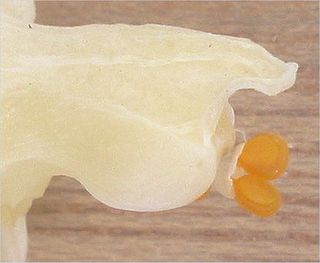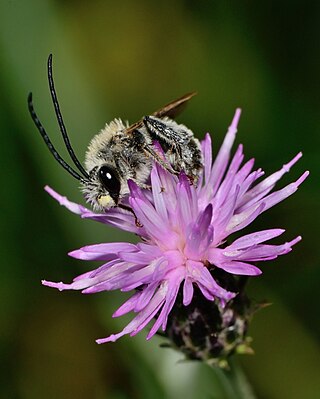
A pollinium is a coherent mass of pollen grains in a plant that are the product of only one anther, but are transferred, during pollination, as a single unit. This is regularly seen in plants such as orchids and many species of milkweeds (Asclepiadoideae). Usage of the term differs: in some orchids two masses of pollen are well attached to one another, but in other orchids there are two halves each of which is sometimes referred to as a pollinium.
The Wanda Mountains are located in the Heilongjiang Province of China.

The Eucerini are the most diverse tribe in the family Apidae, with over 32 genera worldwide that were previously classified as members of the family Anthophoridae. All species are solitary, though many nest in large aggregations, and large "sleeping" aggregations of males are found occasionally. Most genera are distinctive in the unusually long male antennae from which the tribe derives its name. They are most diverse in the Western Hemisphere.

Osmundastrum is genus of leptosporangiate ferns in the family Osmundaceae with one living species, Osmundastrum cinnamomeum, the cinnamon fern. It is native to the Americas and eastern Asia, growing in swamps, bogs and moist woodlands.

The cinnamon neopipo or cinnamon manakin-tyrant is a species of bird in the family Tyrannidae. It is the only member of the genus Neopipo.

The rufous paradise flycatcher is a species of bird in the family Monarchidae. It is found in Indonesia and the Philippines. Its natural habitat is subtropical or tropical moist lowland forests.

Rosa majalis is a species of deciduous shrubs in the genus Rosa, native to forests of Europe and Siberia. It grows to 2 m. and yields edible hip fruits rich in vitamin C, which are used in medicine and to produce rose hip syrup.
Xyletobius euceras is a species of beetle in the family Ptinidae.
Mirosternus euceras is a species of beetle in the family Ptinidae.
Krasilnikovia cinnamomea is a bacterium species in the genus Krasilnikovia.

Eucera is a genus of bees in the family Apidae, which comprises more than 100 species. These bees are commonly known as long-horned bees due to their characteristically long antennae, especially in males. Eucera species can be found in diverse habitats, including meadows, fields, and urban gardens, primarily in the Palearctic and Nearctic regions, covering parts of Europe, Asia, North Africa, and North America.

Eucera longicornis is a species of bee in the family Apidae, subfamily Apinae, and tribe Eucerini, the long-horned bees.

Eucera fulvitarsis is a species of long-horned bee in the family Apidae. It is found in North America.

Eucera rosae is a species of long-horned bee in the family Apidae. It is found in North America.

Eucera frater is a species of long-horned bee in the family Apidae. It is found in North America.
Eucera cordleyi is a species of long-horned bee in the family Apidae. It is found in North America.
Nephrotoma eucera is a species of large crane fly in the family Tipulidae.

Eucera actuosa is a species of long-horned bee in the family Apidae. It is found in North America.












